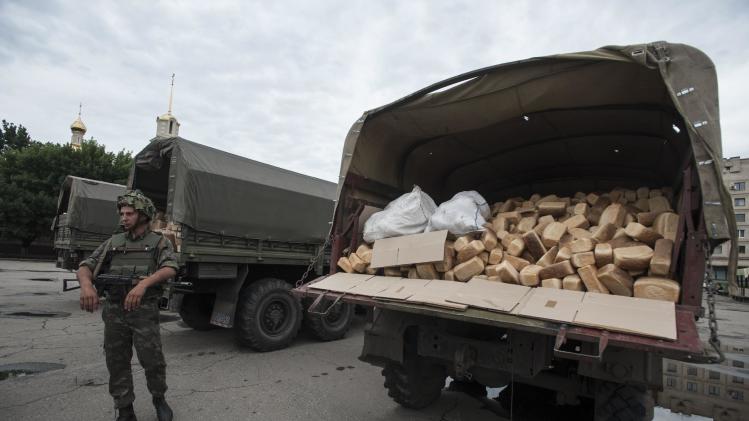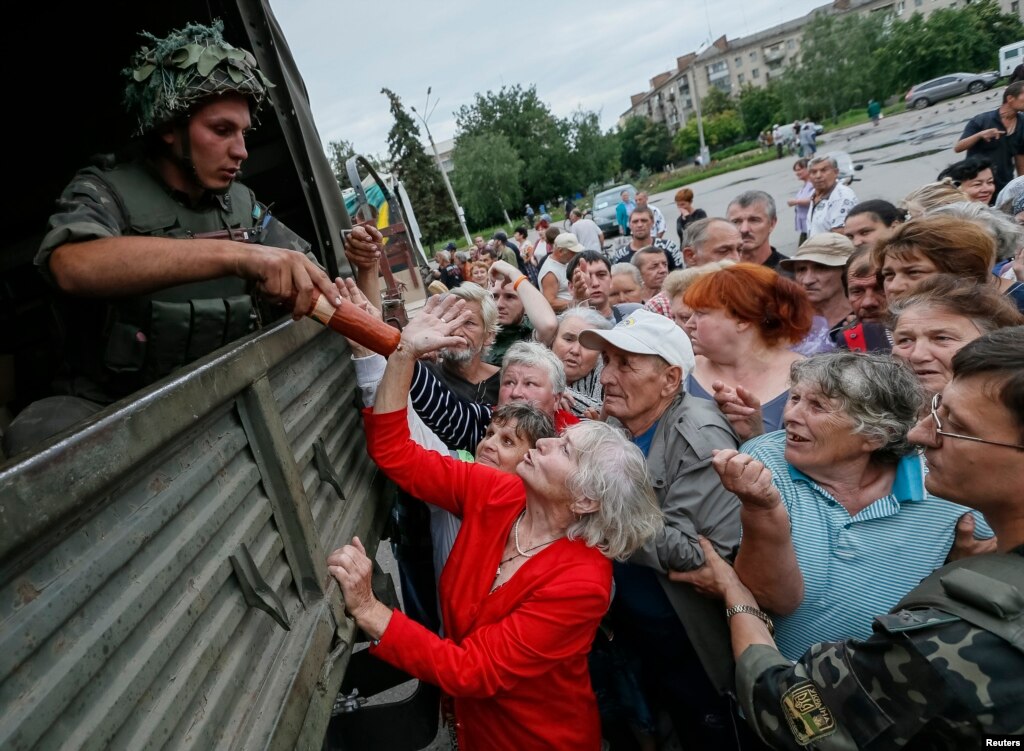
Residents receive food from employees of the Emergency Ministry near City Hall in the eastern Ukrainian city of Sloviansk on July 6.
SLOVYANSK, Ukraine (AP) — For the first time in three months, Alla Grebenkova says she can go out on the streets of this city in eastern Ukraine without fear of being recognized as Ukrainian.
"I lived in hell. It was complete chaos and lawlessness," the 68-year-old teacher said of life in Slovyansk after it came under the control of pro-Russia separatists in April. "I was afraid to admit that I am Ukrainian. Finally, this absurdity has ended."
The rebels fled Slovyansk, a city of 100,000 that had been their stronghold, over the weekend as Ukrainian troops mounted an offensive. They left behind a city heavily damaged by fighting and riven by vehemently differing views.
The government soldiers may have won the battle for the physical city but not yet for its people's hearts and minds.

Many residents in Slovyansk feel Russian by all measures except their passports. The city, 150 kilometers (90 miles), from the border with Russia, had once been part of the Russian Empire and Russian is its dominant mother tongue. Resentment is high toward the Ukrainian authorities who came into power in Kiev after Russia-friendly President Viktor Yanukovych fled in February after months of mass protests.
Like Grebenkova, Dmitry Novikov is relieved that the fighting in Slovyansk is over — yet for him, it's not liberation but failure and disappointment. The separatists and their sympathizers were eager for Russian military intervention and had begged Russian President Vladimir Putin to annex the region like he did the mostly Russian-speaking Crimean Peninsula in March.
"Russia sold us out," the 56-year-old Novikov said. "We lost because Putin decided not to help us. We feel ourselves deceived and tossed aside."
"We will never be reconciled with the fascists in Kiev," he added, using the common phrase pro-Russia residents here apply to the central government in Kiev.
Those easterners claim the Kiev government aims to suppress their use of the Russian language and wipe out their ethnic identity. In the early days of the new government, lawmakers did vote to repeal a law allowing Russian to be a "regional language." The move was quashed by the acting president but the damage was done: Russian-speakers lost faith in Kiev.

Grebenkova says the insurgents were just as much to blame for the ethnic animosity. Her sister, Olga, was held for more than a month by the separatists just for using the Ukrainian language, she said.
"This is our Ukrainian land and it will remain Ukrainian," she declared.
There are severe physical scars to heal in Slovyansk as well as psychological ones from the fierce battles that led to the city being recaptured. Although most of the city's buildings are still standing, many suffered damage.
"My house is no more. I live on the street," said 54-year-old Nataliya Manzello. "The Ukrainian authorities must be held accountable for all the damage. They razed the city to the ground."
Grebenkova said an artillery shell blasted away part of her apartment and she was forced to take shelter in a basement with friends.

On Monday, the city had no electricity, water or gas. Its hospital was operating on electricity supplied by portable generators, but chief surgeon Arkady Glushchenko said gasoline for those critical machines was in danger of running out soon.
Not a single store was open and the only source of food was the humanitarian aid being brought in by soldiers. It was a makeshift solution, but for many it was a step toward normal life.
"My daughter ate her fill for the first time in months and slept in her bed rather than the basement," said Olga Hitrik, 35.
She spoke as she held the hand of her 10-year-old daughter, who was clutching a five-liter bottle of water.
"For me this is happiness, " Hitrik said. "I want to forget everything like a nightmare. Now I know that my daughter will live in Ukraine."
USA Today: 08. July 2014
People In Eastern Ukraine City Decide To Stay Or Go
BERDYANSK, Ukraine -- Tamara Dmitruk has nightmares about the day she found her husband's bullet-riddled body under a sheet by the side of the road. Ruslan had left their apartment in Slovyansk the night before to find food for his family.
A Ukrainian soldier gives bread to local residents in Slavyansk, eastern Ukraine, Sunday, July 6, 2014.
Ukrainian troops on Saturday forced the rebels out of Slavyansk, a city of about 100,000 that had been the center of the fighting. The success there suggests that the government may finally be making gains in the months-long battle against the Russian insurgency.
After that happened, Dmitruk, 27, and her 7-year-old son Denis jumped onto a battered minibus with six other women and two children to head for the Svytogorsk Monastery a dozen miles away.
They found the 120 monks taking care of 300 other refugees — mostly women and children — from the fighting between government forces and pro-Russian separatists in eastern Ukraine.
Dmitruk decided she would leave the Slavyansk area when there was a lull in the fighting — and never return.
When government forces chased the rebels out of the area on Saturday, she headed for a friend's home in Zaporozhye, a city of 770,000 that has yet to see combat.
She felt guilty leaving her friends at the monastery, she said.
"Most of them are staying because they simply have nowhere else to go," she said.
The city of Donetsk, another rebel stronghold in eastern Ukraine, is expecting an offensive from government forces.
As Slavyansk returns to calm, with the government handing out food and restoring water and electricity, the estimated 40,000 residents who remained during the fighting and the 80,000 who fled are wrestling with the same decision Dmitruk had to make:
Help rebuild Slavyansk or get a fresh start elsewhere to escape the bloody memories.
Rebuilding will be a challenge.



Mortars, howitzers, rockets and grenades destroyed 60% of the city, residents estimate.
One person who decided to stay is 79-year-old Mariya Strizhova.
The retired teacher was heartbroken when her son, Alexander, 47, began fighting with the separatists and her other son, Sergei, 40, with the government forces.
Relatives outside Slavyansk offered to pluck her to safety several times, but she refused.
"My sons have different views of Ukraine," Strizhova said.
"One sees the motherland as the nation of Ukraine, the other as the Donetsk Peoples Republic. But they both have a common motherland — Slavyansk. And I must wait for them here in the only motherland both know."
That wait has been dangerous.
One day she went out for milk.
"A Russian separatist militiaman shot in front of my feet to stop me, and asked what I was doing," she said.
"I told him my son was a militiaman fighting for the Donetsk Peoples Republic, and he let me pass."
She hasn't heard from either son for months.
But she believes that if she continues to pray to Saint Nicholas every night, both will return.

Ukrainian forces ready to move elsewhere, Slavyansk, July 6 2014
Nikolai Prodanov also stayed in Slavyansk during the fighting — in a vain attempt to protect the business he was running.
Slavyansk is famed for its spas — many of them in former Soviet bloc countries are combinations of recreation centers, natural-healing centers and medical clinics.
The spa that Prodanov was managing was the largest in Slavyansk, employing more than 1,000 people.
The shelling by government forces that intensified in June and remained heavy until the separatists left on Saturday damaged many of the spa's buildings.
That included the on-site hotel and — particularly upsetting to Prodanov — a treatment center for those with disabilities.
Rebuilding will require more than $1 million, he estimates, and he doesn't know whether the national company that owns the spa will find the money right away.
"We've gone through all our savings," he said about the conflict's impact on his own family.
"In fact, we have little to live on right now."
Even if the spa can be rebuilt, Prodanov wonders whether he could find enough workers to reopen it.
"Most of the staff left Slavyansk," he said.
"The sad thing is that many will never return. Everyone knows the city is going to have to be rebuilt virtually from scratch."
One good sign is the phone began ringing after the separatists fled, Prodanov said, with callers wanting to know if the spa was open again.
"We've been replying that the war has destroyed the spa, and we don't know what will happen next. We're asking people to call back in two or three weeks. But we don't know if we'll have an answer for them when they do."


No comments:
Post a Comment